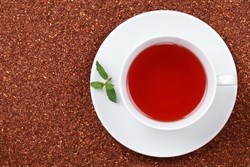Protecting rooibos trademark, promoting economic growth

The reciprocal agreement between South Africa and the European Union sees South Africa's rooibos and the EU's feta cheese get GI protection and gives rooibos producers ownership and authority over the name.
Dawie de Villiers, Chairman of the SA Rooibos Council, says, "Obviously we're delighted that this iconic South African product now enjoys international protection under a robust regulatory framework.
"Governments have an obligation to protect their nations' assets and the Department of Trade and Industry's (the dti) efforts in securing GI for rooibos could provide real impetus for other intrinsically local products. By rights, a GI for rooibos should be fairly simple undertaking. It's grown in a very specific and limited part of the Western Cape and nowhere else in the world.
"So an attempt, for example, by the French company Compagnie de Trucy to register rooibos as French was mischievous, to say the least.
We were delighted that Trade and Industry Minister, Rob Davies scrutinised the issue from all angles and then acted boldly."
Setting a precedent for the protection of other products
Gazetting a proposal to protect rooibos and names such as Rooibosch, Rooibostee, Rooitee and Red Bush under the Merchandise Marks Act now protects this globally unique product under domestic law. This enables the dti to seek international protection using WIPO (World Intellectual Property Organisation).
"This could help set a precedent for the protection of other products from a specific, localised area, such as Honeybush tea and Karoo lamb."
GI's are used to protect products specific to a region, which is why champagne may only be labelled as such if it comes from the Champagne area of France, and Darjeeling tea from a specific area of India, and Colombian Coffee from Colombia.
De Villiers adds: "Achieving this protection for rooibos was partly the result of eight years of intensive research, collation of fact and some intensive lobbying. The GI allows a number of important steps. From the perspective of growing the rooibos sector, quality control is crucial, as it enables us to ensure the authenticity of products containing rooibos tea blends. A minimum of 80% rooibos content is required for it to be described as an official rooibos product."
Other crucial benefits include rooibos' use as a powerful tool for promoting regional tourism and for protecting the biodiversity of the area, which is especially important considering the fynbos region's fragile ecosystem.
All these benefits will in turn contribute to the socioeconomic development of the area and the livelihoods and dignity that sustainable development will yield.
"It means, in short, that SA's rooibos tea producer can take ownership of the rooibos name and that name may only be used on products they produce and which are endorsed by them," concludes De Villiers.